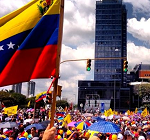The protests in Venezuela have escalated to violence, and a face-off between the security forces and protestors has killed at least 18 persons since February 12. The student-led protesters have demanded the resignation of President Nicolas Maduro on the issues of uncontrolled crime, a shortage of essential items, and the repression of opposition parties. The government has detained several protestors and accused the opposition of conspiracy to create instability through the riots.
The protests have taken on external dimensions as well. In February, the Venezuelan government expelled three U.S. diplomats, accusing them of conspiring with the opposition. It also revoked the press credentials of CNN journalists and removed a Colombian channel, NTN 24, from the Venezuelan cable system for allegedly biased coverage. Venezuelan authorities accused the former president of Colombia, Alvaro Uribe, of being a conspirator, and in response the Colombian government issued a statement advising its Venezuelan counterpart to stop making baseless allegations.
While right-wing U.S. legislators and leaders in Latin America have said they sympathise with the protestors, the leftist governments of Latin America, including in Brazil and Argentina, have expressed solidarity with the Venezuelan government.
Panama called on the Washington-based Organisation of American States (OAS) to discuss the issue, but Venezuela managed to block the move. The Venezuelan foreign minister has suggested that the 12-member UNASUR (South American Union) may be the right forum to help resolve the crisis in his country.
The protests are possibly only a political headache for the government, which can be controlled. But the government has not been able to control the deteriorating economic situation and the rise in crime and violence, especially in Caracas.
Inflation in Venezuela is high – 56% in 2013. The government has impaired the productive capacity of the private sector, thereby ruining industry and business. The inefficient state control of distribution and imports has resulted in an acute shortage of essential items and long lines at supermarkets with empty shelves.
Despite substantial oil export earnings of over $80 billion annually, there is a severe shortage of foreign exchange reserves. The government has imposed restrictions on foreign exchange, imports and foreign travel; this has given rise to a rampant black market and corruption.
However, the government itself is responsible for creating these problems over the years, which it may now not be able to solve. A change in government may be a solution, but that change has to be constitutional and democratic. The opposition must ensure the support of the poorer sections of the population, which support the present Chavista government. Using this approach, presidential candidate Henrique Capriles came close to beating Maduro in the 2013 elections. By continuing this strategy, the opposition can come to power and change the present set of policies.
But the government has accused the opposition of a hidden agenda in the ongoing protests. The opposition led a similar series of protests in 2002, which resulted in a military coup in which Hugo Chavez was overthrown. But the military, which colluded with the opposition, changed sides and brought back Chavez in 48 hours when it got left out by the opposition in the distribution of spoils. The opposition must learn from 2002 and avoid an unconstitutional regime change.
Venezuela is India’s largest trading partner in Latin America, with $14.4 billion of trade in 2012. Of this, $14.1 billion was in imports of crude oil – Venezuela is now one of the top five sources of India’s crude oil imports. Indian oil companies have invested over $2 billion in the Venezuelan oil sector. The political developments in Venezuela, although not yet worrying, are therefore relevant for India.
Ambassador Viswanathan is Distinguished Fellow, Latin America Studies, Gateway House. He is the former Indian Ambassador to Argentina, Uruguay, Paraguay and Venezuela, and Consul General in Sao Paulo.
This article was written exclusively for Gateway House: Indian Council on Global Relations. You can find more exclusive features here.
For interview requests with the author, or for permission to republish, please contact Reetika Joshi at outreach@gatewayhouse.in or 022 22023371.
© Copyright 2014 Gateway House: Indian Council on Global Relations. All rights reserved. Any unauthorized copying or reproduction is strictly prohibited.


